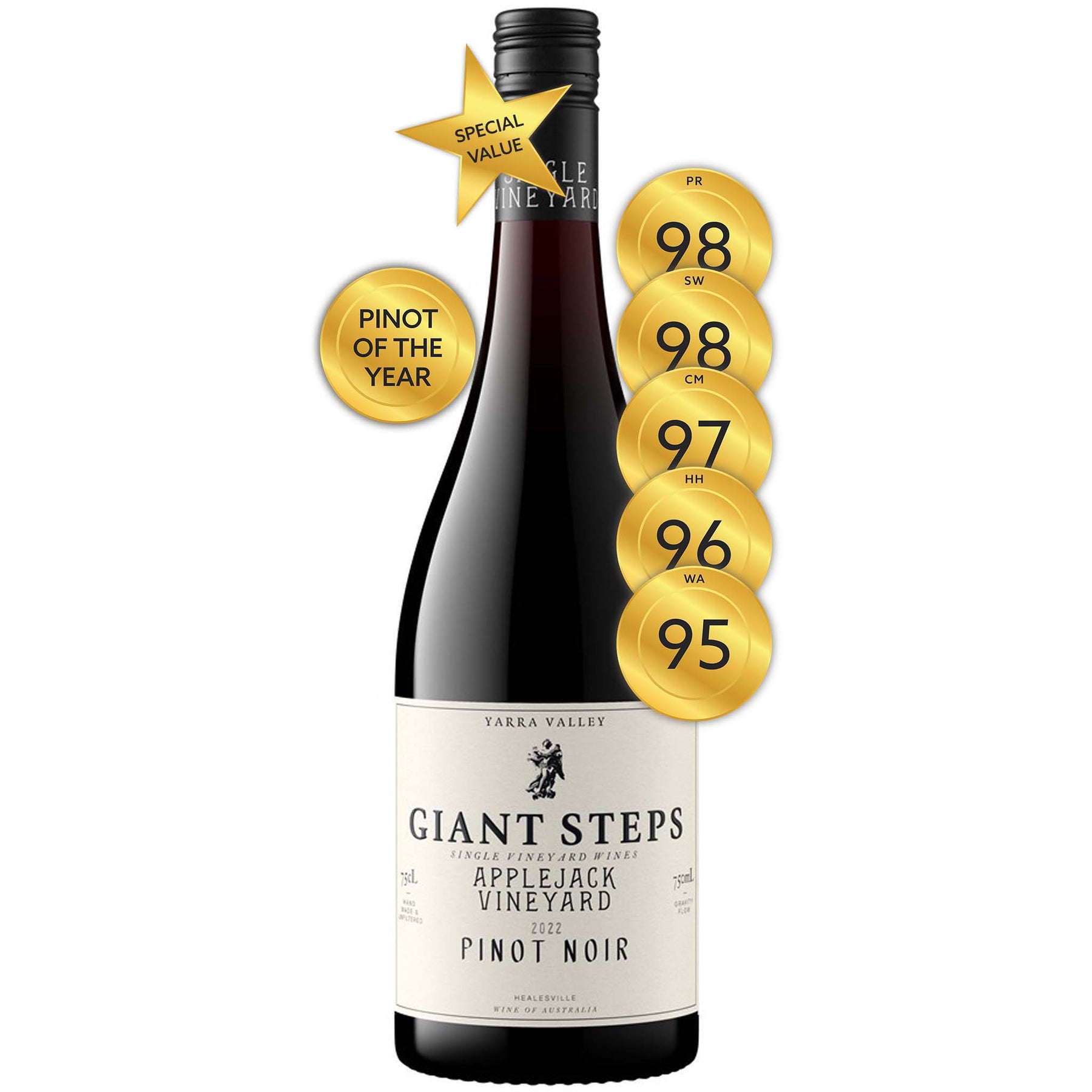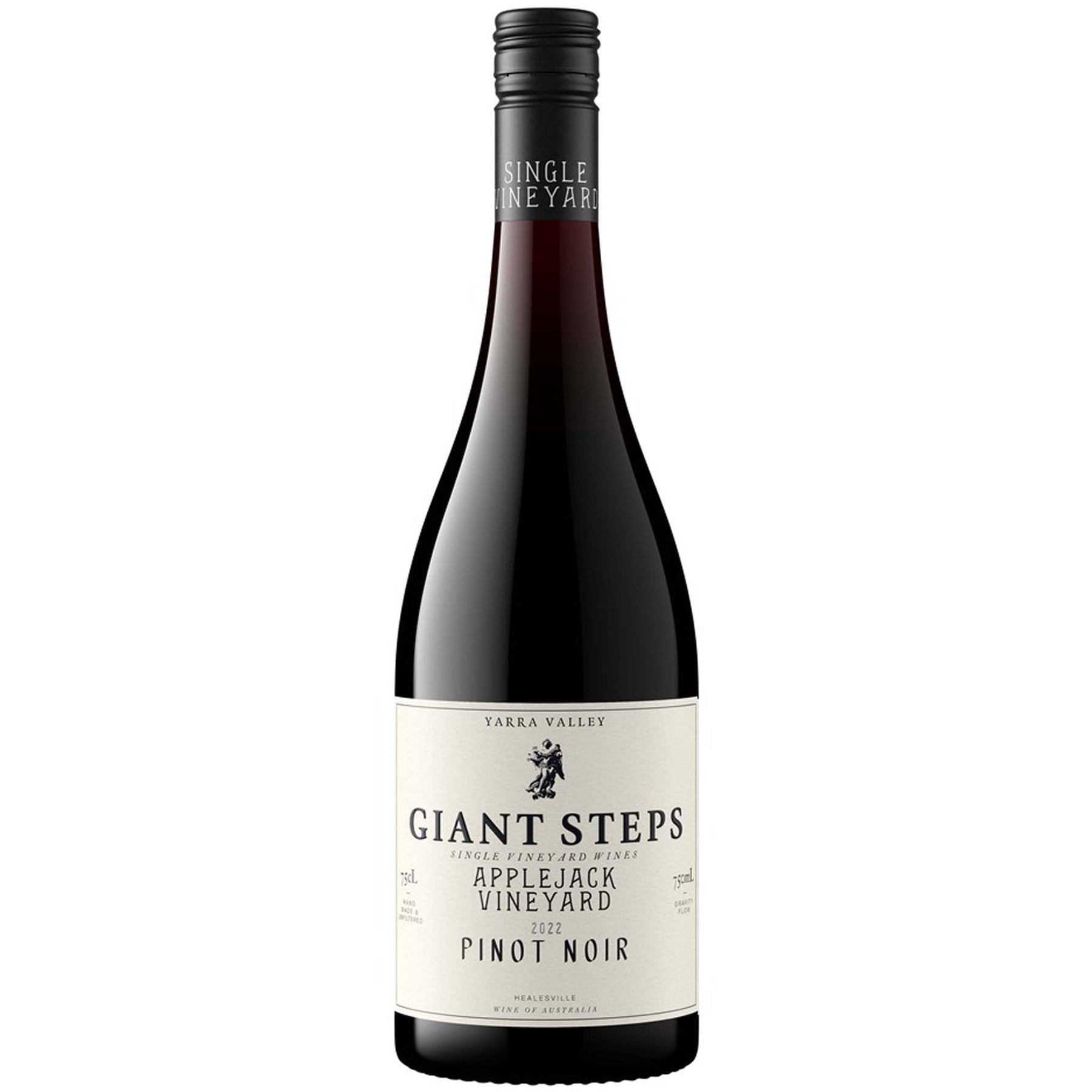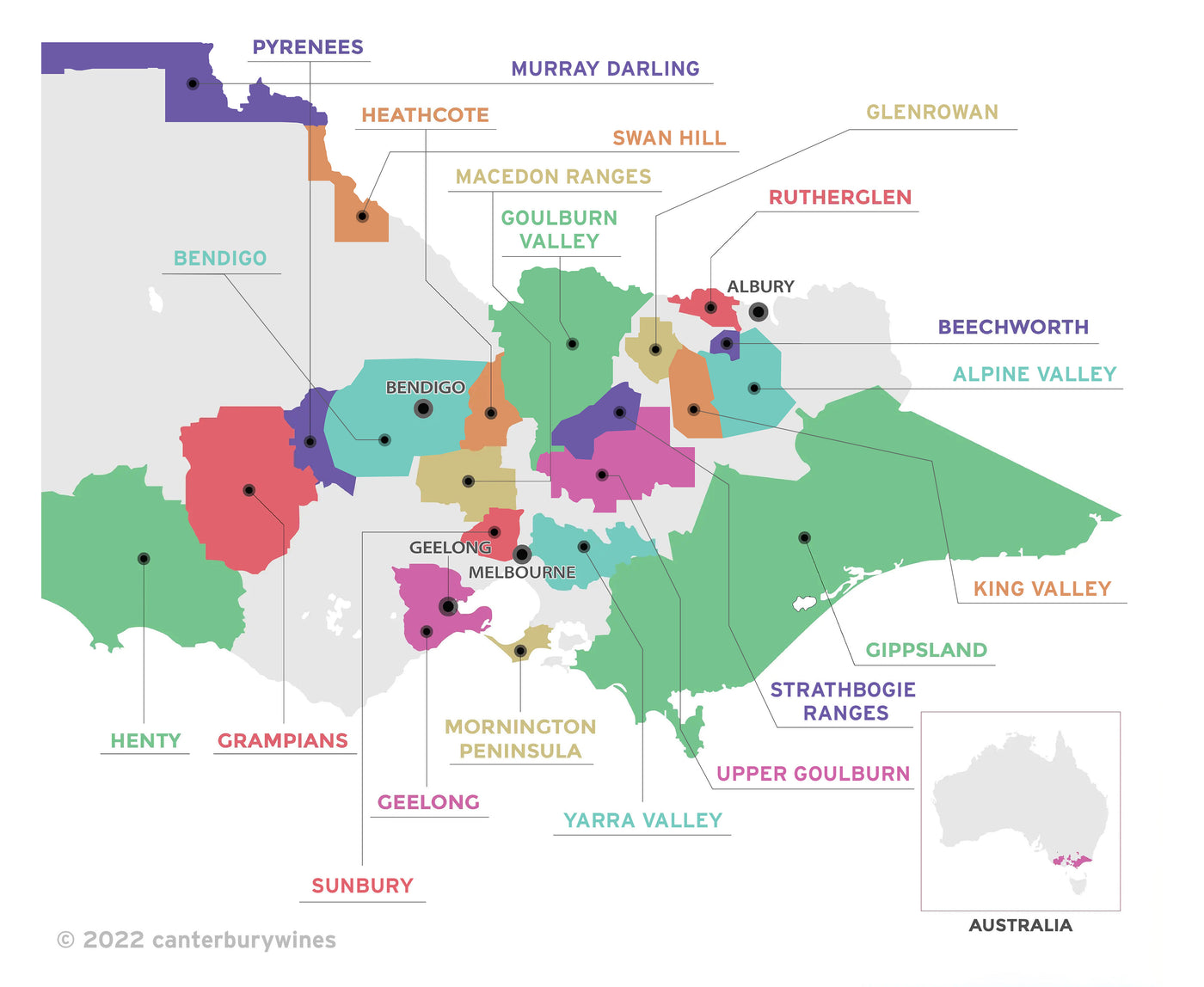

Giant Steps Applejack Vineyard Pinot Noir 2022
Style: Red Wine
Closure: Screwcap
Giant Steps Applejack Vineyard Pinot Noir 2022
Warehouse
34 Redland Drive
Vermont VIC 3133
Australia
Critic Score: 98
Alcohol: 13.0%
Size: 750 ml
Drink by: 2036
Pinot Noir of the Year - Halliday Wine Companion Awards 2024
"It is a ripping wine and was a clear winner at the Awards judging"
Giant Steps is recognized as a global benchmark for cool climate Chardonnay and Pinot Noir. The winery was established in 1998, one year after founder Phil Sexton arrived in the Yarra Valley in search of ideal sites to produce Chardonnay and Pinot Noir of purity and finesse. The Giant Steps Single Vineyard range is produced from the most site-expressive fruit from the best vineyards in great years.
"Like a Mahler symphony, all of the elements of this wine are in perfect harmony. This is the most concentrated, structured and saline Applejack I can remember, yet you barely notice the tannins due to the core of pure raspberry and cherry fruit. There's a gentle sappiness on the long, lingering finish. Simply irresistible." Philip Rich
The Applejack Vineyard, named after the Applejack eucalypts that surround the vineyard, is located at Gladysdale in the upper Yarra Valley. It was planted in 1997 by respected viticulturist Ray Guerin and is meticulously managed by his son Mark. This vineyard was purchased by Phil Sexton in 2013. Located at an elevation of 320 metres, the higher altitude results in a cooler and extended growing season (3-4 weeks later than central Yarra Valley) and is ideally suited to growing Pinot Noir and Chardonnay. Applejack Vineyard is located on a dramatic, northeast-facing slope with close-planted vines. The vineyard is planted to seven Pinot Noir clones - 114, 115, MV6, D2V5, D5V15, Pommard and Abel.
"I've long considered the Applejack vineyard to be one of the greatest sites for pinot in Australia." Philip Rich
"Hand picked, all fruit is chilled overnight to 12 degrees Celsius. Fermented in small oak fermenters and stainless steel open vats. The Pommard parcels were fermented as whole bunches, while the remaining clones were destemmed to whole berries and cold soaked for five days. The resulting blend is almost 20% whole bunch. All parcels were matured in French oak 20% new, 80% older – for ten months in 225L barriques, Taransaud and Dargaud & Jaeglé. Racked to blend, no fining, no filtration. Bottled by gravity." Giant Steps
Expert reviews
"Named after the Applejack eucalypts that surround the vineyard, which was planted at Gladysdale in 1997. Seven clones comprising 114, 115, MV6, D2V5, D5V15, Pommard and Abel. Whole bunches (15%) and 20–25% new French barriques. Like a Mahler symphony, all of the elements of this wine are in perfect harmony. Aromas of crushed rose petals, red and black cherries, satsuma plums and subtle hints of sandalwood and fennel fronds. There's a little charcuterie and a discreet touch of wet stone. On the palate, this is the most concentrated, structured and saline Applejack I can remember, yet you barely notice the tannins due to the core of pure raspberry and cherry fruit. There's a gentle sappiness on the long, lingering finish. Simply irresistible. Drink by 2032." Philip Rich, Halliday Wine Companion – 98 points, Pinot Noir Varietal Winner 2024 and Special Value Wine ★
"A careful selection of clones fermented as whole bunches and others destemmed whole berries resulting in around 20% whole bunch total. Matured in 20% new French oak and 80% older barriques. The Applejack is once again assertive in its slew of blackcurrant, juniper and Nyon olive. Dried black cherries, inky plums and layers of herbs and spice. Bayleaf, lingonberries, licorice and allspice. Wood Ear mushroom, black truffle and coffee pods. The palate is a crunch of blood plums and beetroot juice with finely meshed tannins and finishing with turned potting soil. This is a roller coaster of wildly exotic fruits, spice and undergrowth. Flavours continue to echo long after the glass is laid down. A wine of exultation and total confidence. Will cellar up to 8 years and pair beautifully with venison. An absolute baller of a wine." Shanteh Wale, Wine Pilot – 98 points
"The key to this being one of the great pinot sites in Australia: east facing slope on grey soils. There’s a 100 metres of drop from the top of the vineyard to the bottom, which is pretty amazing. There’s also significant clonal diversity in this vineyard. It was planted in 1997.
What a wine this is. It’s a bloom of fruit, it’s wild with herbs, there are sweet-sour nuances and there’s a controlled run to the finish. Winemaker Mel Chester says: 'everything you love about pinot noir, is in this wine.' A reductive savouriness, particularly noticeable on the finish, is the icing. This is a stunning wine. Stunning fruit, and stunning structure, and stunning length. Drink: 2024 - 2030+." Campbell Mattinson, The Wine Front - 97 points
"Medium-full red with a purple rim, the bouquet red and darker cherries, dusty dried-herb notes, a trace of nutty oak, a hint of liqueured cherry as it aired. There is excellent intensity and volume of flavour, allied with good structure thanks to well shaped tannins, the finish long and the flavour and structure finish right out. Superb pinot noir. Drink: 2025–2036." Huon Hooke, The Real Review - 96 points
"The Applejack Vineyard Pinot component is planted on east-facing slopes with a mix of clones: Abel, Dijon (114, 115), Pommard, MV6. There was a 15% to 20% whole-bunch component in the final wine. The 2022 Applejack Vineyard Pinot Noir is all about Japanese spice (miso?, good), cherry blossom, red apples, kirsch, star anise and ginger root. This is an elegant, spicy and savory wine with loads of flavor; the tannins are firm and ductile; and the fruit is fleshy and supple. Drink: 2023 - 2038." Erin Larkin, Wine Advocate - 95 points
Awards
Pinot Noir of the Year - Halliday Wine Companion Awards 2024
Special Value Wine – Halliday Wine Companion ★
 In 1997 Phil Sexton arrived in the Yarra Valley in search of ideal sites to produce Chardonnay and Pinot Noir of purity and finesse. He was looking for sites with altitude, aged soils, slopes of exposure, regular rainfall and cool to cold nighttime temperatures and a gentle breeze off the protecting mountain ranges. The Giant Steps winery was established one year later in 1998.
In 1997 Phil Sexton arrived in the Yarra Valley in search of ideal sites to produce Chardonnay and Pinot Noir of purity and finesse. He was looking for sites with altitude, aged soils, slopes of exposure, regular rainfall and cool to cold nighttime temperatures and a gentle breeze off the protecting mountain ranges. The Giant Steps winery was established one year later in 1998.
The focus is on the production of high-quality, single-vineyard wines. The Giant Steps Single Vineyard range is produced from the most site-expressive fruit off the best vineyards in great years. Each single vineyard wine tells a story about the vineyard, vintage and variety. Production of these wines is very limited with some vineyards producing as little as 200 cases.
The single vineyards comprise the Sexton Vineyard in the Lower Yarra and the Applejack Vineyard in the Upper Yarra (both owned by Giant Steps), the Tarraford Vineyard in the Lower Yarra under long-term lease, the Primavera Vineyard in the Upper Yarra under long-term supervised contract and the Wombat Creek Vineyard owned by Hand Picked Wines. In addition, Giant Steps produce a Yarra Valley range of wines made from handpicked fruit from their estate vineyards. They are highly expressive wines, true to the regional characteristics of the Yarra Valley.
The Giant Steps wines have received global acclaim and are now recognized as a global benchmark for cool climate Chardonnay and Pinot Noir. Since 2003 Giant Steps wines have been awarded 34 trophies and over 100 gold medals at major international and domestic wine shows and has been named one of the Top 100 Wineries in the World by US Wine & Spirits Magazine for each of the last six years.
Giant Step's success is due in no small part to Steve Flamsteed, Chief Winemaker since 2003. Steve had previously worked for Leeuwin Estate (1999 – 2002) and the Hardy Wine Company at their Yarra Burn Winery in the Yarra Valley (2002 – 2003). Steve was named Gourmet Traveller Wine 'Winemaker of the Year' in 2016. "Steve Flamsteed is a man of many talents with a finely tuned palate, an instinctive flair for winemaking and fastidious attention to detail. This shows particularly in the stunning single-vineyard chardonnays and pinots of Giant Steps: distinctive wines that reflect their sites and glow with impeccable finesse." Peter Forrestal, chairman of judges, Gourmet Traveller Wine Winemaker of the Year
Melanie Chester joined Giant Steps as Head of Winemaking and Viticulture in 2021. She came to Giant Steps from Sutton Grange Winery in Central Victoria, where she was Head Winemaker. In 2014, Melanie became the youngest ever scholar selected for The Len Evans Tutorial. In 2015, she was named Young Winemaker of the Year by Gourmet Traveller Wine magazine, and in 2018, Melanie was recognized by Young Gun of Wine as the People's Choice award winner for favourite winemaker.
Giant Steps was acquired by the Jackson Family in 2020. The Jackson Family own a vast stable of wineries in California (Napa Valley, Sonoma County, Mendocino County, Monterey County, Santa Barbara and Oregon), Australia (Yarra Valley and McLaren Vale), Chile, France, Italy and South Africa.

Victoria
Victoria is home to more than 800 wineries across 21 wine regions. The regions are Alpine Valley, Beechworth, Bendigo, Geelong, Gippsland, Glenrowan, Goulburn Valley, Grampians, Heathcote, Henty, King Valley, Macedon Ranges, Mornington Peninsula, Murray Darling, Pyrenees, Rutherglen, Strathbogie Ranges, Sunbury, Swan Hill, Upper Goulburn and Yarra Valley.
Victoria's first vines were planted at Yering in the Yarra Valley in 1838. By 1868 over 3,000 acres had been planted in Victoria, establishing Victoria as the premier wine State of the day. Today, the original vineyards planted at Best's Wines are among the oldest and rarest pre-phylloxera plantings in the world.
Victoria's climate varies from hot and dry in the north to cool in the south and each wine region specialises in different varietals. For example, Rutherglen in the north is famous for its opulent Muscats and Topaque and bold reds, while the many cooler climate regions near Melbourne produce world class Chardonnay and pinot Noir. Victoria is truly a wine lover's playground.


 Applejack Vineyard (Upper Yarra Valley)
Applejack Vineyard (Upper Yarra Valley)

